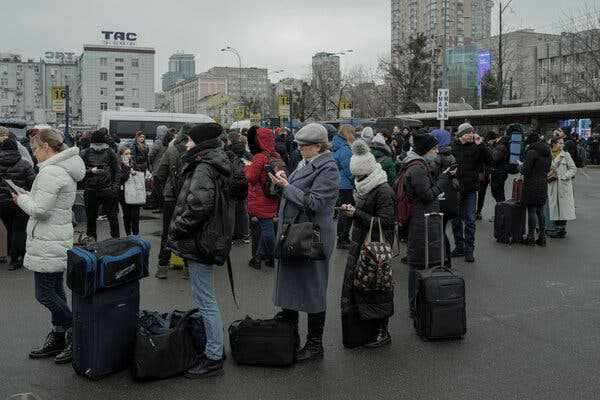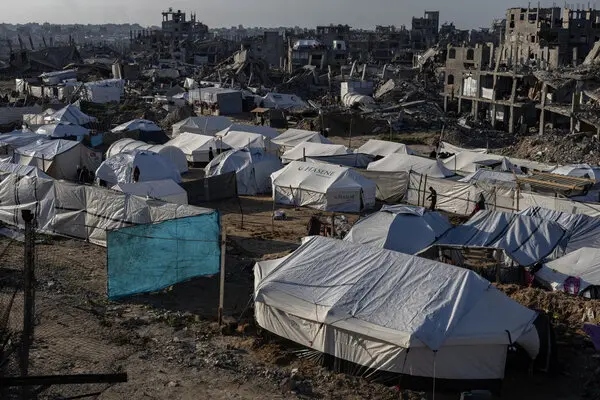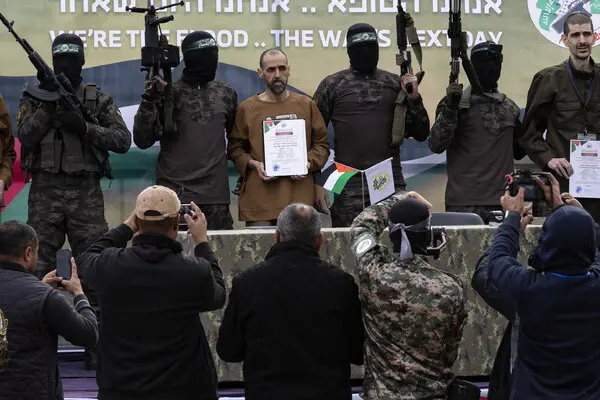The penalties will affect Russia’s biggest banks, its weapons industry, its largest energy company and families close to President Vladimir V. Putin. The country’s stock market has plummeted.

Residents lined up at a bus station in Kyiv, Ukraine’s capital, on Thursday.Credit…Emile Ducke for The New York Times
Daleep Singh, the deputy national security adviser for international economics, told reporters that over time, the sanctions would “translate into higher inflation, higher interest rates, lower purchasing power, lower investment, lower productive capacity, lower growth and lower living standards in Russia.”
But it is unclear whether the sanctions will compel Mr. Putin to halt his offensive, in which dozens of Ukrainian soldiers and civilians have already been killed, according to Ukrainian officials. If Mr. Putin pushes forward, then the sanctions will serve as a punishment, Mr. Blinken has said.
Some analysts are skeptical that the pain of the sanctions will break through to Mr. Putin, who has isolated himself during the pandemic, even from some of his close advisers.
Alexander Gabuev, a scholar at the Carnegie Moscow Center, said the Russian leader and the top officials around him had adopted a bunker mentality, understanding that their lives and wealth depend on their status at home, not within Western nations. They also see themselves as being on the frontline of an ideological contest with the United States and its allies, he said.
Furthermore, the Russian government adopted fiscal policies to shield the country’s economy after the United States and Europe imposed sanctions in 2014 following Mr. Putin’s first invasion of Ukraine, and some top security officials and oligarchs have profited off the changes.
Live Updates: Russia Attacks Ukraine
Updated Feb. 24, 2022, 9:01 p.m. ET
- Photographers capture the uncertainty and fear among Ukrainians.
- Russian invasion forces penetrate Ukraine on multiple fronts and close in on Kyiv.
- Zelensky says Russian saboteurs are in Kyiv and he is Moscow’s prime target.
Edward Fishman, who oversaw sanctions policy at the State Department after Russia annexed Crimea in 2014, said he was surprised at the breadth of the new U.S. sanctions beyond the financial and technology sectors. He said the measures limiting access to capital markets for Russian state-owned enterprises in industries as varied as mining, metals, telecommunications and transportation “cut across the commanding heights of the Russian economy.”
Even as Russia’s stock market plunged and the ruble fell to a record low against the dollar, the country may avoid all-out financial panic. Sergey Aleksashenko, a former first deputy chairman of the Central Bank of Russia and former chairman of Merrill Lynch Russia, said the financial measures were likely to inflict serious but ultimately bearable pain.
“They will be able to manage what is related to the financial sector,” Mr. Aleksashenko said. “Maybe it will be complicated, maybe it will be expensive — but it’s doable.”
More damaging, albeit over a longer term, Mr. Aleksashenko said, would be the new technology export controls.
The export controls imposed by the Commerce Department are aimed at severing the supply of advanced technologies to Russia, such as semiconductors, computers, lasers and telecommunications equipment.
The measures are expected to stop direct technological exports from American companies to Russia, potentially hobbling the Russian defense, aerospace and shipping industries, among others. They also go beyond previous sanctions issued by the U.S. government by placing new export limits on products that are manufactured outside the United States but use American equipment or technology.
The administration said the measures, taken in concert with allies, would restrict more than $50 billion of key inputs to Russia. The country imported $247 billion of products in 2019, according to the World Bank.
“This is a massive set of technology controls,” said Emily Kilcrease, a senior fellow at the Center for a New American Security.
Understand Russia’s Attack on Ukraine
Card 1 of 7
What is at the root of this invasion? Russia considers Ukraine within its natural sphere of influence, and it has grown unnerved at Ukraine’s closeness with the West and the prospect that the country might join NATO or the European Union. While Ukraine is part of neither, it receives financial and military aid from the United States and Europe.
Are these tensions just starting now? Antagonism between the two nations has been simmering since 2014, when the Russian military crossed into Ukrainian territory, after an uprising in Ukraine replaced their Russia-friendly president with a pro-Western government. Then, Russia annexed Crimea and inspired a separatist movement in the east. A cease-fire was negotiated in 2015, but fighting has continued.
How did this invasion unfold? After amassing a military presence near the Ukrainian border for months, on Feb. 21, President Vladimir V. Putin of Russia signed decrees recognizing two pro-Russian breakaway regions in eastern Ukraine. On Feb. 23, he declared the start of a “special military operation” in Ukraine. Several attacks on cities around the country have since unfolded.
What has Mr. Putin said about the attacks? Mr. Putin said he was acting after receiving a plea for assistance from the leaders of the Russian-backed separatist territories of Donetsk and Luhansk, citing the false accusation that Ukrainian forces had been carrying out ethnic cleansing there and arguing that the very idea of Ukrainian statehood was a fiction.
How has Ukraine responded? On Feb. 23, Ukraine declared a 30-day state of emergency as cyberattacks knocked out government institutions. Following the beginning of the attacks, Volodymyr Zelensky, Ukraine’s president, declared martial law. The foreign minister called the attacks “a full-scale invasion” and called on the world to “stop Putin.”
How has the rest of the world reacted? The United States, the European Union and others have condemned Russia’s aggression and begun issuing economic sanctions against Russia. Germany announced on Feb. 23 that it would halt certification of a gas pipeline linking it with Russia. China refused to call the attack an “invasion,” but did call for dialogue.
How could this affect the economy? Russia controls vast global resources — natural gas, oil, wheat, palladium and nickel in particular — so the conflict could have far-reaching consequences, prompting spikes in energy and food prices and spooking investors. Global banks are also bracing for the effects of sanctions.
The biggest impact would be on Russia’s economy and its military capability over time, she said, as electronics, airplanes and ships wear out and Russian entities find themselves unable to buy new generations of technology.
“It is freezing Russia’s technology stock where it is today,” Ms. Kilcrease said. “You can’t upgrade it, you can’t replace it, you can’t improve it.” Or as Mr. Aleksashenko put it: “That is a problem you cannot solve, no matter how much you are ready to pay.”
Russia could look to China, a close partner, to try to fill in some of the technology gaps, but U.S. officials say Chinese companies have not replicated the more advanced American products. Chinese firms also run the risk of U.S.-imposed penalties if they are caught violating sanctions, as the tech giants Huawei and ZTE were.
ImageThe new sanctions include export controls, which could hobble Russia’s ability to improve its military and technological capabilities over time.Credit…Reuters
Sergei Guriev, a professor of economics at Sciences Po in Paris, said the sanctions would damage Russia’s economy but would not “result in a macroeconomic meltdown.” He pointed to Russia’s large sovereign wealth fund and the country’s enormous foreign currency reserves — $631 billion, the fourth-largest in the world.
“To destroy Russia’s macroeconomic stability,” he said, “the West would have to sanction Russia’s Central Bank and introduce an Iran-style embargo on energy exports,” steps that U.S. officials have not proposed.
On Tuesday, the Biden administration announced it was imposing sanctions on two Russian banks, VEB and PSB, but those are policy banks with no retail operations in Russia.
The two named on Thursday — Sberbank and VTB — are the biggest banks in Russia and have retail operations, and the pain will go deeper. The new sanctions bar American companies from interacting with Sberbank and prevent it from using U.S. dollars in transactions, which is critical for global commerce.
The penalties on VTB are tougher. They are what Treasury Department officials call “full blocking sanctions,” meaning all of the bank’s assets in U.S. financial institutions are frozen. It has been put on the harshest sanctions list, known as the S.D.N. list, and foreign companies will most likely keep their distance from it for fear of being penalized by Washington.
The Treasury Department said VTB was among the largest institutions it had ever blocked. The agency also imposed full blocking sanctions on three other Russian financial institutions.
“That’s really going to be the test: Does Fortress Russia hold up when you have assets that may be frozen overseas?” said Daniel Tannebaum, a partner at Oliver Wyman who advises banks on sanctions.
For now, U.S. and European officials are not ready to cut off all Russian banks from Swift, the Belgian money transfer system used by more than 11,000 financial institutions worldwide. But a senior Biden administration official told reporters on Thursday that such an action was not off the table. In Europe, governments differ on whether to untether Russia from Swift.
U.S. officials for now do not plan big disruptions to Russia’s energy exports, which are the pillar of the country’s economy. Europe relies on the products, and world leaders do not want to drive oil and gas prices higher, though Germany did halt the Nord Stream 2 gas pipeline project this week.
European Union leaders met in Brussels on Thursday evening and pored over the details of proposed sanctions, which they insisted would deliver a heavy blow to the Russian economy.
But documents seen by The New York Times indicated that the bloc, which has close financial ties to Russia and shares borders with Ukraine, would probably defer several difficult decisions, despite pleas from Poland, the Netherlands and the Baltic States to take a hard-line approach.
“Enough of this cheap talking,” said Prime Minister Mateusz Morawiecki of Poland, which has already received Ukrainians fleeing the war. He added: “We are buying as Europe, as the European Union, lots of Russian gas, lots of Russian oil. And President Putin is taking the money from us, Europeans. And he’s turning this into aggression.”
Matina Stevis-Gridneff contributed reporting from Brussels, and Alan Rappeport from Washington.
Source: nytimes.com



